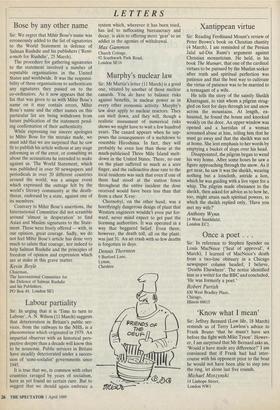Xantippean virtue
Sir: Reading Ferdinand Mount's review of Peter Brown's book on Christian chastity (4 March), I am reminded of the Persian Jalal ud-Din Rumi's argument against Christian monasticism. He held, in his book The Masnari, that one of the cardinal virtues to be pursued by the Muslim seeker after truth and spiritual perfection was patience and that the best way to cultivate the virtue of patience was to be married to a termagant of a wife.
He tells the story of the saintly Sheikh Kharragani, to visit whom a pilgrim strug- gled on foot for days through ice and snow across the mountains. At length, ex- hausted, he found the house and knocked weakly on the door. An upper window was opened and a harridan of a woman screamed abuse at him, telling him that he must go away and that the sheikh was not at home. She lent emphasis to her words by emptying a bucket of slops over his head.
Disappointed, the pilgrim began to wend his way home. After some hours he saw a figure approaching through the snow. As it got near, he saw it was the sheikh, wearing nothing but a loincloth, astride a lion, which he was guiding with a live viper for a whip. The pilgrim made obeisance to the sheikh, then asked for advice as to how he, too, might attain such spiritual powers, to which the sheikh replied only, 'Have you met my wife?'
Anthony Wynn
14 West Smithfield, London EC1


















































 Previous page
Previous page